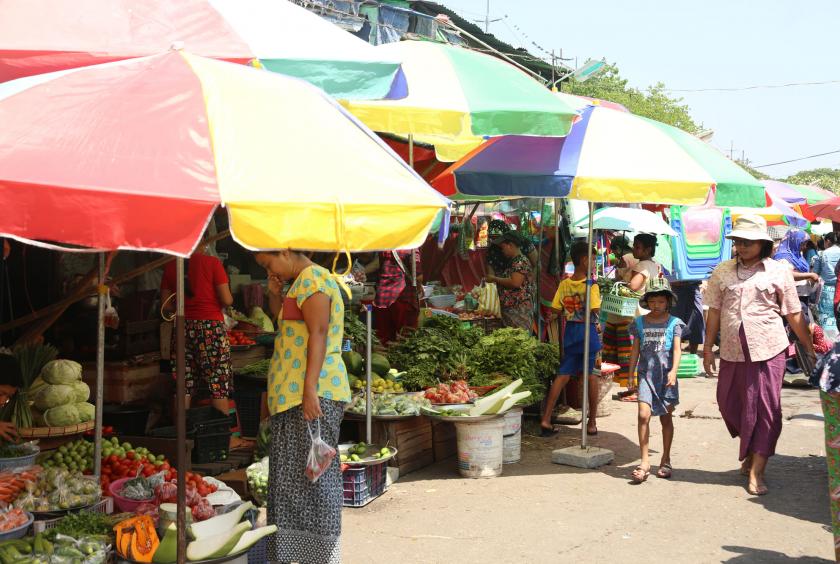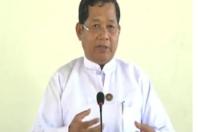The report on the Survey on Myanmar’s economy from the World Bank said that COVID-19 Pandemic was a severe attack on the economy.
Generally, Myanmar Economic Monitor projects Myanmar’s economy to grow at 6.8 percent in 2018-19 fiscal years. But, the rate will decline to 0.5 percent in a lower-case scenario. The COVID-19 caused the biggest economic depression around the world. It is very harmful to 90 percent of the global economy. Either way, many countries are facing the prospect of a global financial shock and recession due to COVID-19.
Myanmar’s economy has already been hit by the effects of the pandemic, with tourism, the garment sector and agriculture exports all suffering.
Hans Anand Beck, the World Bank Lead Economist for Myanmar, said that the Supply Chain was severely stricken, especially the garment industry.The import of raw materials from China had stopped. Remittance activities from overseas Myanmar migrants also ceased. It all adds to a great deal of losses to a good amount of Myanmar’s households.
He added that Myanmar's economy shrank about 5 percent compared to before the COVID-19 outbreak.
“It’s critical to look at saving lives and minimizing the impact of COVID-19 on people,” he said.
“This means stopping the spread of pandemic and taking measures to boost spending in health. It also means providing income support for households. For businesses, it means deferring tax payments, making credit available and generally taking measures to ensure business continuity.”
Strict travel restrictions with the aim to control the spread of COVID-19, seriously impacted on tourism and transport sectors.
Beck said the Myanmar government had already taken some positive steps to respond to the health and economic risks posed by COVID-19, such as the early introduction of social distancing measures and a stimulus package for businesses.
The government is considering what further action to take, he said.
“It’s about being innovative to redeploy resources to the health frontline,” he said, noting that in other countries, factories have been retooled to produce medical equipment needed for the health response.
“It’s about making health budgets bigger and also softening the blow for individuals by, for instance, offering income support, and focusing on containment, tracking and testing. All these costs money and in the Myanmar case the government is responding.”
“The [Myanmar] economy can recover quickly with the right mix of health and economic policies,” it said. “Building on early announcements the government should focus on adding health resources where most needed, supporting firms with access to credit and households with temporary relief for lost incomes.”
Moreover, it fights against the rising domestic inflation rate.
The average inflation rate was 8.35 percent in May. The rate declined compared to the previous month April.
Consumers mainly faced inflation in the food sector. Next, other commodities which are not food also are increasing in price. There is a difference in the electricity charge compared with July last year and this year July. If we look at the inflation rate, there is about a 5 percent difference especially it affected households according to Hans Anand Beck.
Besides, Myanmar's economy is severely affected in the tax sector due to COVID-19. Compared with last year's statistics, about 6 percent has dropped in taxes than last year which got normal taxes.
Due to the travel restrictions caused by the pandemic, about 90 percent of Myanmar's economy has stopped progressing.
If Myanmar is compare with world nations on spread on COVID-19 and rate of death toll, it is found that then number of spread of COVID-19 and death rate is much less but it is severely faced in economic sector according to chairman of Union of Myanmar Chamber of Commerce and Industry (UMFCCI) Zaw Min Win.
“Due to the pandemic, businesses connecting locally and internationally faced many restrictions and experienced challenges,” said UMFCCI chairman Zaw Min Win.
UMFCCI has submitted some suggestions concerning circulation of local businesses and to create job opportunities during and after COVID-19 to State Counselor Aung San Suu Kyi.
The first thing he suggested to the State Counselor is if the State can act as guarantor in order to borrow money from local banks in Myanmar and foreign banks which operate in Myanmar. It will create more cash investment, he suggested. The second thing is to consider the private sector for recovering the economy in mid-term and drawing development projects for long-term interest. The third thing is the Board on enhancing export must be formed with the government and private sectors. Then only, it can develop an increase of export products. The fourth thing is to create more job opportunities, to give priority in promoting local businesses for the uplift of social and economic lives of local people, to create an environment which has equal opportunities for competing, then only, more factories can open and can compete with foreign products that are imported and more jobs can be created according to UMFCCI chairman.
As a final point, he suggested having continuous assessments between government and businesses sectors after COVID-19.
The World Bank pointed out that the current crisis showed it is very important to coordinate policies between health and economic sectors.
For example, the government has implemented an economic relief plan (CERP) to mitigate economic impacts of COVID-19. The aim of CERP is to provide businesses to have economic stability in the country, to give assistance to the poor, to prevent the challenges faced in the future and to solve these problems and to uplift the country’s ability.
As the progress of the world economy is slow as well as the progress of Myanmar's economy is slow and it is estimated that Myanmar economy will be 6.4 percent in 2019-2020 and it has been changed to 0.5 percent.
As the baseline assumption, the progress of Myanmar economy will be at 7.2 percent in 2020-2021 financial years.
It is estimated that progress of the economy was on track before COVID-19 as there are increases in export, investment in basic infrastructure, increases in services sector. It was estimated that inflation rate will be 7.5 percent higher during the period.










